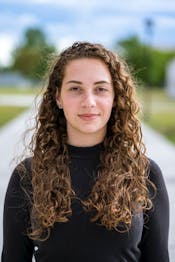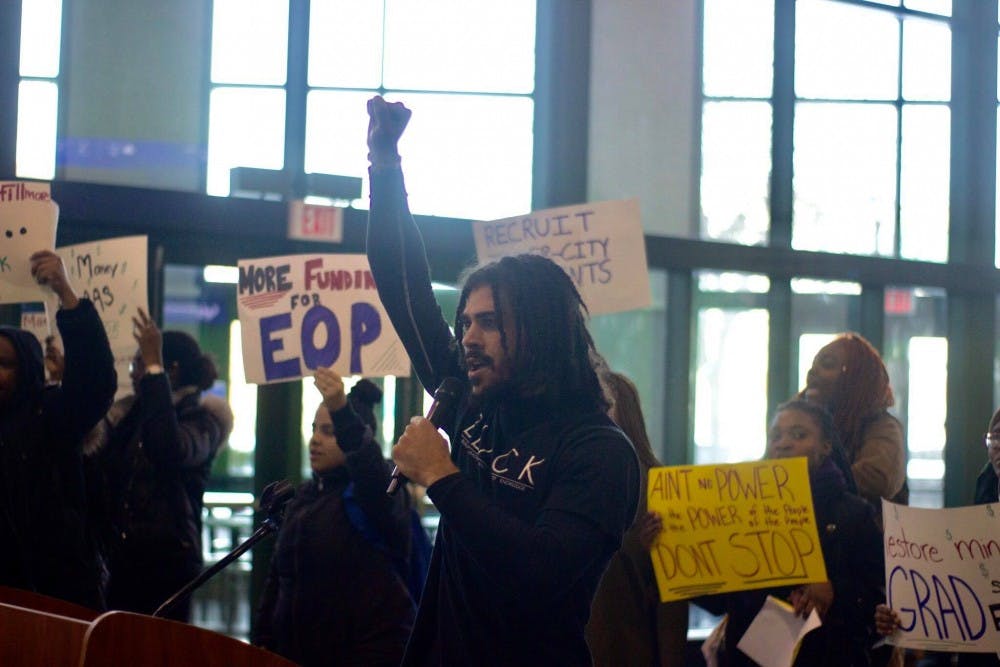Students protested for the African and African American Studies Program Friday afternoon in the Student Union.
Over 50 students and faculty members gathered to join or watch the demonstration, as students demanded UB administration increase funding and resources toward the Educational Opportunity Program and the AAS program. The students also demanded structures named after 13th U.S. president and UB founder Millard Fillmore be renamed to honor activist Frederick Douglass. The students chanted phrases like “more money for EOP, more black faculty” and held signs that read “end white supremacy,” “more funding for EOP” and “from Millard Fillmore to Frederick Douglass.”
The Pre-Law Chapter of the National Black Law Students Association organized the demonstration, which started in the academic spine as the protesters marched into the Student Union.
UB merged the AAS program with the Transnational Studies Program nine years ago.
UB’s past Distinguished Speaker and political activist Angela Davis suggested at her speech on Wednesday that AAS students should create a petition advocating for the program’s independence.
Ph.D. student James Ponzo said Davis’ advice motivated the protest on Friday and the group’s petitions, which they distributed during the demonstration.
Ponzo said the protest is important in getting the attention of the administration.
Asli Ali, a senior AAS major said she reached out to administration, inviting them to the group’s discussions, “but they haven’t responded,” she said.
UB spokesperson John DellaContrada wrote in an email that cuts to the EOP program were decided on a state-level but that it was “a high-advocacy priority” for UB.
“Whenever there have been cuts to the EOP program in the governor’s budget, SUNY and UB have strongly advocated for the restoration of the program budget,” DellaContrada wrote. “We are extremely proud of the program and advocate for its ongoing support at every opportunity.”
Ali spoke on a podium during the protest and quoted UB President Satish Tripathi’s comments on black students in academia, which were taken from a 2016 Spectrum interview with Tripathi.
“If you look at how many Ph.D. students are coming out that are African American in a particular field, the numbers are much smaller and we have to go back and think how many are actually going through college and finishing high school,” Tripathi said in 2016.
Ali said the quote was used in full during her speech and she said the statement supported a “racist narrative.”
DellaContrada said the quote was referring to Tripathi’s “support” for programs that increase the number of African American graduates.
“The president’s statement from 2016 was actually in reference to how UB and other universities nationwide should and can help to increase the number African American students who graduate with PhDs,” DellaContrada said. “Doing so will help increase the number of African American faculty at our nation’s universities.”
Ponzo said the university initially had plans to introduce new faculty members of color, but then announced funding cuts for AAS on Thursday, the day after Davis’ visit.
DellaContrada said UB “is not cutting or reducing” the program.
“The College of Arts and Sciences is in the process of developing a plan to remake and strengthen the Transnational Studies department, including strengthening African and African American Studies,” DellaContrada wrote. “This includes developing a stronger focus on social justice and addressing race issues across cultures and countries while also creating programs that will lead to better cultural understanding around the world.”
Ponzo said, “on a more personal level,” that representation at UB is “essential.”
“When [people of color] come to a PWI –– a predominantly white institution –– school is very stressful,” Ponzo said. “So when you find students that look like you, when you see faculty that look like you, when you even see workers that look like you, it’s very important in encouraging you and helping you with the daily rigours of academia.”
Ali said the movement “isn’t going to end” with Friday’s protest, and she ended her speech with words to motivate the crowd moving forward.
“Stay angry and stay hungry and demand change,” she said.
Brittany Gorny contributed to this story.
Tanveen Vohra and Jacklyn Walters are Co-senior News Editors and can be reached at news@ubspectrum.com and on Twitter @TanveenUBSpec and @JacklynUBSpec.

Jacklyn Walters is a senior communication major and The Spectrum's managing editor. She enjoys bringing up politics at the dinner table and seeing dogs on campus.
Tanveen Vohra is a former senior news editor and covered international relations and graduate student protests.






